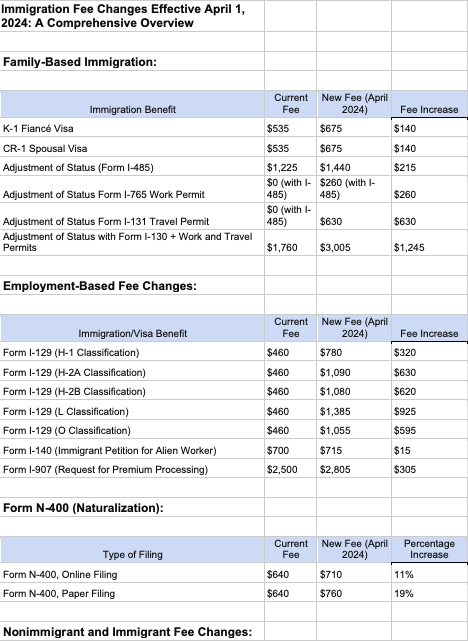Effective April 1, 2024, USCIS will increase most fees for immigration petitions and applications and modify its filing fee structure. This newsletter aims to guide you through the critical adjustments and help you to navigate the forthcoming changes easily.
The Good News: Amidst the fee increases, there are positive changes worth noting. The longstanding fee waiver policy has been codified, allowing a child's means-tested benefits receipt to qualify for an applicant's fee waiver.
In addition, although fee waivers for specific applications will continue to be accepted, many humanitarian applications no longer require a fee. This includes applications for T visas (victims of human trafficking), U visas (victims of violent crimes), VAWA (victims of domestic violence who are immediate relatives of a lawful permanent resident or U.S. Citizen abuser), and SIJS (immigrants under age 21 who have been abused, abandoned or neglected by one or both parents).
USCIS has extended eligibility for the reduced naturalization fee to individuals with incomes between 150% and 400% of the Federal Poverty Guidelines. Notably, the process for requesting a reduced naturalization fee has been integrated into the N-400 form.
Additionally, biometrics fees have been consolidated with general application fees for most forms, eliminating a separate $85 fee (with exceptions for TPS and EOIR filings).
Lastly, application fees to renew permanent resident cards decreased by $75 ($125 if filed online).
The Bad News: The overall trend indicates an increase in most fees. USCIS will now charge separately for the I-765, I-131, and I-485 rather than applying one fee to all three applications. Fortunately, however, the filing fee for the I-765 (work permits) will be reduced by half to $260 if filed together with the I-485. However, renewals will cost a total of $520.
Although a $50 online filing discount has been introduced, the online system is complicated for those represented by attorneys and disadvantages those without reliable internet access or digital literacy.
Employers must now pay a one-time Asylum Program Fee of $600 for each Form I-129 and I-140 they file. Small employers will also be required to pay an Asylum Program Fee but at a discount of $300. Nonprofits will be exempt from this fee.
Beginning March 2025, the H-1B cap registration fee will increase to $215 from $10 per registration.
Premium processing timeframes have been lengthened by adjusting from calendar to business days. The increase in premium processing fees went into effect on February 26, 2024.
Important Dates and Instructions: Mark your calendars! Applications, petitions, or requests postmarked on or after April 1, 2024, must adhere to the new fees and updated forms. A grace period until June 3, 2024, allows for using older versions of most forms, with a few exceptions for specific employment-based and orphan petition forms.
Strategic Considerations: For those planning to file before April 1, 2024, priority is advisable for family-based and employment-based adjustment applicants, especially those applying based on a pending adjustment. However, strategic advantages for applicants contemplating a delay until April 1, 2024, include fee exemptions for humanitarian applicants, reduced naturalization fees for specific income brackets, and the anticipated decrease in the I-90 green card renewal fee.
Please see below all proposed changes:

If you have any further questions, don't hesitate to reach an immigration attorney from USILG at (714) 786-1166.

